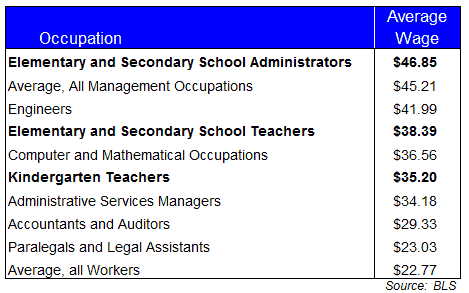
They help shape your children’s mind; spending countless hours, teaching them reading, writing and arithmetic and little is thought about their wages till a strike is called and your children are at home. Some parents (and teachers) say they are not paid enough while others say they are vastly overpaid, especially since they get 2 months a year off and are off at the end of the day often hours before other employed folks. Suffice it to say in the US and Canada, one of the most common arguments in society involves the pay of teachers in correlation to the service that they provide.
One common theory in society today, is that one of the main reasons the educational system fails the students, and often brings about such poor results in education is because teachers are underpaid for the amount of work they perform. After all, today they are held to high standards and their performance is often measured by data extracted from standardized testing and student performance, which brings the question of whether teachers are truly solely responsible for the ability and success of every child’s learning experience. After all, while they may control what is offered in the classroom, they have little to no control of what happens after the bell rings and children are home with their families. This is just one reason teachers in poverty and crime stricken school districts report high burnout rates and often quit their job feeling as if they are making little to no difference, yet being burdened with the responsibility of teaching children.
The thing is that despite the nice benefits of days off, and shorted hours, and an average income that is 35% more than the average employee is, teachers are government employees. As such, in the United States teachers pay eats up about 30% of the local, state, and federal government tax dollars. As government employees, these teachers are public servants, and their salaries and compensation are hinged upon tax dollars. According to Forbes magazine, in the US, around 50% of tax dollars are spent to pay administrators and personnel in the public school venue, whereas only 5% is used to pay first responders such as EMT’s and firefighters and police.
So what happens when teachers go on strike, and demand more money? Tax dollars are simply increased. In public education, teachers go into the field of education clearly aware of the pay and benefits. And then due to demands on performance, as well as the typical responsibilities of acting as parents to children, teachers tend to burn out and become resentful and demand more money. Then, you have teachers striking like happened this year in Canada. (Which many don’t believe should even be an available line of protest from government employees who voluntary work in public service)
It’s also interesting to look at actual teacher wages. The following chart, provided by the US Bureau of Labor and Statistics shows the ‘average’ wage for public school teachers. And this chart is void of representing the additional benefits to salary of retirement, healthcare and savings options that are available for teachers. When you look at these numbers, do you still think teachers are overpaid or underpaid?


On average public school teachers make 8% more than other workers, considered middle class in the United States.
Of course, teachers are also left with dealing with bratty kids, the onslaught of learning disorders and behavioral disorders and do quite a bit of work from home. Does this instantly require more money? And, while there is some hoopla about the availability of qualified teachers – universities are graduating educators at an expansive rate that seems to keep down the consequences (higher pay) associated with supply and demand. While teaching may be a private sector, government job – there is still plenty of teachers to go around to fill jobs, and those willing to work for the pay, find it fairly easy to find jobs.
Certainly, teachers do not have an easy job. There is a lot of stress involved. They have to deal with parents, and parenting and bratty kids and are responsible for shaping young minds and the future generation. There is a lot of worth associated with the job that they perform. But to date, that ‘worth’ is not one that can be properly attached to a specific salary. And so, the conversation about whether teachers are under or overpaid will continue. What do you think? Are teachers paid too much, or are they gravely under paid for the service that they provide to society?
